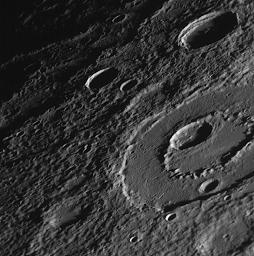
|
Peak-Ring Basin Close-Up from the Second Mercury Flyby
- Click the image above for a larger view
- Full-Res JPEG (1018 x 1024) (190.8 kB)
- Full-Res TIFF (1018 x 1024) (1.0 MB)
Caption:
Taken about 28 minutes following MESSENGER's closest approach during the mission's second Mercury flyby, this NAC image, just one of a large mosaic set, focuses in on an impact basin with a nicely developed peak-ring structure. Subsequent impact events have resulted in smaller craters superimposed on top of the larger peak-ring basin. This basin is located in the un-imaged "gore" region (see PIA11397 ) in the Mariner 10 coverage of Mercury's surface, a gap that has largely been filled by images from MESSENGER's recent Mercury flyby (see PIA11354 ). Peak-ring structures form during the impact process and can be found in many large basins on Mercury's surface. Check out the image released on June 17 for other examples of peak rings on Mercury (see PIA10936 ).
Date Acquired:
October 6, 2008
Image Mission Elapsed Time (MET):
131771478
Instrument:
Narrow Angle Camera (NAC) of the Mercury Dual Imaging System (MDIS)
Resolution:
190 meters/pixel (0.12 miles/pixel)
Scale:
The bottom of this image is about 190 kilometers (120 miles) across
Spacecraft Altitude:
7,400 kilometers (4,600 miles)
Background Info:
These images are from MESSENGER, a NASA Discovery mission to conduct the first orbital study of the innermost planet, Mercury. For information regarding the use of images, see the MESSENGER image use policy .
Cataloging Keywords:
| Name | Value | Additional Values |
|---|---|---|
| Target | Mercury | |
| System | ||
| Target Type | Planet | |
| Mission | MESSENGER | Mariner |
| Instrument Host | MESSENGER | Mariner 10 |
| Host Type | Orbiter | Flyby Spacecraft |
| Instrument | Mercury Dual Imaging System (MDIS) | |
| Detector | Narrow Angle Camera (NAC) | |
| Extra Keywords | Crater, Grayscale, Impact | |
| Acquisition Date | ||
| Release Date | 2008-11-11 | |
| Date in Caption | 2008-10-06 | |
| Image Credit | NASA/Johns Hopkins University Applied Physics Laboratory/Carnegie Institution of Washington | |
| Source | photojournal.jpl.nasa.gov/catalog/PIA11759 | |
| Identifier | PIA11759 | |
